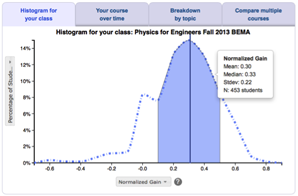Developed by Duane Deardorff and Robert Beichner
| Purpose | To discuss measurement uncertainty concepts with students, and why one answer might be better than the others. |
|---|---|
| Format | Pre/post, Multiple-choice |
| Duration | 15 min |
| Focus | Lab skills (calculating error from measurements, accuracy and precision, sources of error) |
| Level | Intro college |
Sample questions from the MUQ:


MUQ Implementation and Troubleshooting Guide
Everything you need to know about implementing the MUQ in your class.
Login or register to download the implementation guide.
more details
This is the third highest level of research validation, corresponding to at least 3 of the validation categories below.
Research Validation Summary
Based on Research Into:
- Student thinking
Studied Using:
- Student interviews
- Expert review
- Appropriate statistical analysis
Research Conducted:
- At multiple institutions
- By multiple research groups
- Peer-reviewed publication
This quiz is not a standardized diagnostic instrument and has not been tested for reliability and validity. The subject of measurement uncertainty does not lend itself well to a right/wrong test, so even experts may disagree about which answers are "right" on such a test. These questions are a sample of the open-ended questions that were given to approximately 100 introductory physics students and 30 experts (graduate physics students and teachers). The questions were iteratively revised based on the results of student interviews and expert reviews. The most common responses were been edited and included in the MUQ as the multiple-choice options. This quiz is most valuable as an opportunity for discussion with students about why one answer might be better than the others.
References
- D. Deardorff, Introductory Physics Students' Treatment of Measurement Uncertainty, Ph.D. , North Carolina State University, 2001.
We don't have any translations of this assessment yet.
If you know of a translation that we don't have yet, or if you would like to translate this assessment, please contact us!
Score the MUQ on the PhysPort Data Explorer
With one click, you get a comprehensive analysis of your results. You can:
- Examine your most recent results
- Chart your progress over time
- Breakdown any assessment by question or cluster
- Compare between courses
| Typical Results |
|---|
There are no typical results published for the MUQ. |
The latest version of the MUQ, released in 2001, is version 1.





